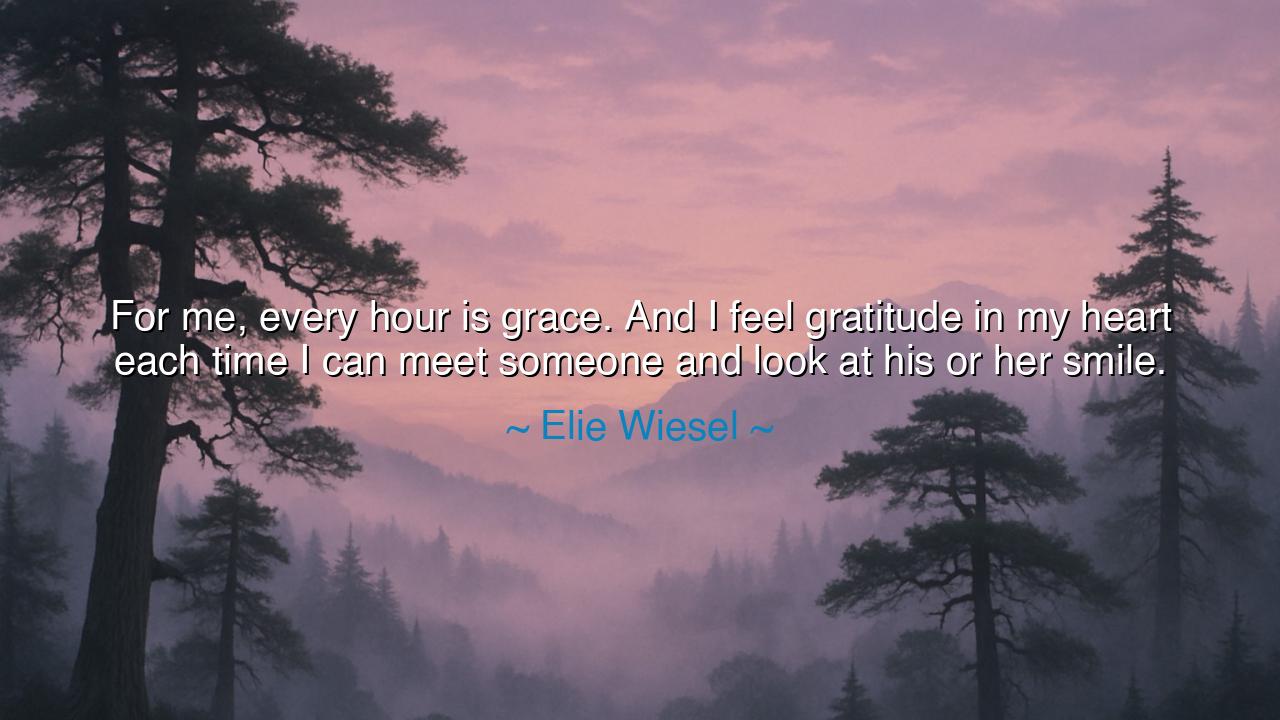
For me, every hour is grace. And I feel gratitude in my heart
For me, every hour is grace. And I feel gratitude in my heart each time I can meet someone and look at his or her smile.






Hear the words of Elie Wiesel, forged in the crucible of suffering and illuminated by the wisdom of survival: “For me, every hour is grace. And I feel gratitude in my heart each time I can meet someone and look at his or her smile.” These words are not idle musings of a man untouched by sorrow. They rise from the ashes of despair, from one who endured the darkest night humanity has ever known. To Wiesel, who walked through the gates of Auschwitz and Buchenwald, every breath beyond those horrors was no longer ordinary—it was grace. Every hour of life after death’s shadow was a gift, and every smile from another soul was a radiant reminder of humanity’s endurance.
The ancients, too, spoke of this truth. The Stoics of Rome declared that life must be accepted with gratitude, for it is fleeting and uncertain. Marcus Aurelius wrote that each morning we awake is fortune itself, and each encounter with others a chance to serve or to love. Wiesel’s words echo this timeless counsel, yet they carry a deeper weight, born not from philosophy alone but from the lived experience of one who saw how easily life could be stripped away. For him, to meet another and see their smile was no small thing—it was victory over cruelty, proof that the human spirit had not been extinguished.
The meaning of his words is profound. To call every hour grace is to shift one’s vision from entitlement to awe. Instead of asking, “What do I deserve?” Wiesel’s perspective asks, “What have I been given?” It is the vision of one who sees time itself as precious beyond measure, and who refuses to waste it in bitterness. The act of seeing another person’s smile, something most dismiss as ordinary, becomes for him a sacred event, a quiet triumph of life and connection.
Consider the story of Viktor Frankl, another survivor of the camps, who wrote that even in the depths of despair, when all possessions and freedoms had been taken, a person could still choose their response—to find meaning, to cherish small moments, to smile at a memory or at a fellow sufferer. In one story, Frankl describes prisoners sharing jokes in the barracks, a spark of laughter amid the misery. That small smile, like Wiesel’s reflection, was more precious than gold, because it proved the soul was still alive.
The heroic strength of Wiesel’s quote is this: it teaches us that gratitude is not reserved for the grand events of life. It is found in the simple, in the fragile, in the fleeting. Every hour is a chance to give thanks. Every smile is a reminder that humanity, though scarred, still holds beauty. By treasuring the small and ordinary, we find a richness of life that wealth and status can never provide.
The lesson for us is clear: do not squander the hours in complaint or despair. See them for what they are—grace, unearned and precious. When you meet another person, look into their face and value their smile, for it is not merely an expression of joy, but a bridge of connection, proof that life is still worth celebrating. Gratitude, practiced daily, transforms existence from burden into blessing.
Practically, this means beginning each day with thanks for the gift of time. When you wake, say to yourself: this hour is grace. When you walk among others, see not strangers, but souls whose smiles are treasures. Offer your own smile freely, for you know not what burden another carries, and your gesture may be their reminder of hope. In this way, you honor Wiesel’s teaching—not merely by remembering his words, but by living them.
Thus, let this truth be passed down: “Every hour is grace, every smile a gift.” It is the wisdom of one who endured the abyss and yet chose to embrace life’s light. May we carry this teaching within us, so that we too may live with gratitude, walk with reverence, and see in each human smile the reflection of divine endurance. For in such gratitude lies not only beauty, but the strength to face whatever darkness may come.






AAdministratorAdministrator
Welcome, honored guests. Please leave a comment, we will respond soon